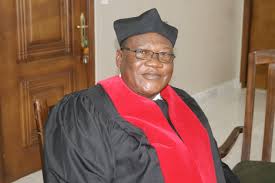-Chief Justice Korkpor says he’ll preside over Justice Ja’neh’s impeachment trial
-Justice-in-Chambers Joseph Nagbe to preside over Wednesday’s Conference
By Our Reporter
The start of the impeachment trial of Associate Justice Kabineh Ja’neh at the Liberian Senate has hit another snag, with the filing of a petition of Prohibition by Justice Ja’eh’s legal team, which was revealed after Chief Justice Francis Korpor denied and dismissed their motion calling for his recusal.
The legal team, headed by Cllr. Arthur Johnson, said it would be conflict of interest for Justice Korkpor to preside over the impeachment trial, as he and other Justices had signed the judgment without opinion in favor of Associate Justice Kabineh Ja’neh for the failure of Madam Annie Yancy Constance to have perfected her appeal.
Justice Ja’neh and Madam Constance had been locked in a heated land case for some time.
Article 90 of the Liberian constitution says:
“a. No person, whether elected or appointed to any public office, shall engage in any other activity which shall be against public policy, or constitute conflict of interest.
b. No person holding office shall demand and receive any other perquisites,
emoluments or benefits, directly or indirectly, on account of any duty required by Government.
c. The Legislature shall, in pursuance of the above provision, prescribe a Code of Conduct for all public officials and employees, stipulating the acts which constitute conflict of interest or are against public policy, and the penalties for violation thereof.”
The Justice-in-Chambers at the Supreme Court, Cllr. Joseph Nagbe cited the leadership of the Senate to a conference on Wednesday, February 20, 2019 at 2:00 p.m. the Temple of Justice for a prohibition petition filed by Justice Ja’neh.
Earlier during the legal arguments, Lawyers for the House of Representative led by Cllr. Syrenius Cephus said if Chief Justice Korkpor were to recuse himself from presiding over the impeachment trial he would be committing treason, which would warrant his impeachment.
Cllr. Cephus also said Article 43 of the Liberian constitution gives the Chief Justice the power to preside over the impeachment trial in the Senate.
It was thought that after denying and dismissing Juatice Kabineh Ja’neh’s motion to recuse himself from presiding over his impeachment trial on Tuesday that a major hurdle had been cleared for the trial to proceed.
The letter from Justice-in-Chambers Nagbe came on the eve of a reserved ruling on the petition for the Chief Justice by Counselors of Ja’neh to recuse himself.
Lawyers of Justice Ja’neh had argued in their motion that it would be conflict of interest for the Chief Justice to preside over the impeachment trial.
The Liberian Chief Justice said in the Senate’s chamber that there were no basis for him to step aside from presiding over the trial
“Thus, the key deciding factor is whether the Justice has made a decision or a pronouncement on the merit of the case. It goes without saying, therefore, that since the Supreme Court did not decide the Constance case on its merits I, as one of the concurring Justices, in that case, have expressed no view and taken no position on the merits of said case that will work prejudice to Justice Ja’neh by my presiding over this impeachment trial,” Korkpor said.
“The further question is: Is it a conflict of interest for the Supreme Court to meticulously apply the law passed by the Legislature? Can one be adjudged liable or guilty for applying the law? The answer is no,” the Chief Justice said.
“Therefore, I committed no conflict of interest when I, along with three other Justices signed the judgment without opinion in favor of Justice Ja’neh for the failure of Madam Constance to have perfected her appeal. So, as I have said time and again, it is by the dictates of the 1986 Constitution that I should preside over this impeachment proceedings; it is not of my making. The Constitution does not say who presides over the impeachment of the president, vice president or an associate justice in the absence of the chief justice or when the chief justice is incapacitated or disqualified,” Korkpor added.
Article 43 of the Liberian constitution gives the Chief Justice the power to preside over treason trial of the President, Vice President and Associate Justices, but it is silent on the issue of recusal by the Chief Justice.
Article 43 says:
“The power to prepare a bill of impeachment is vested solely in the House of Representatives, and the power to try all impeachments is vested solely in the Senate. When the President, Vice President or an Associate Justice is to be tried, the Chief Justice shall preside; when the Chief Justice or a judge of a subordinate court of record is to be tried, the President of the Senate shall preside. No person shall be impeached but by the concurrence of two-thirds of the total membership of the Senate. Judgements in such cases shall not extend beyond removal from office and disqualification to hold public office in the Republic; but the party may be tried at law for the same offense. The Legislature shall prescribe the procedure for impeachment proceedings which shall be in conformity with the requirements of due process of law.”

